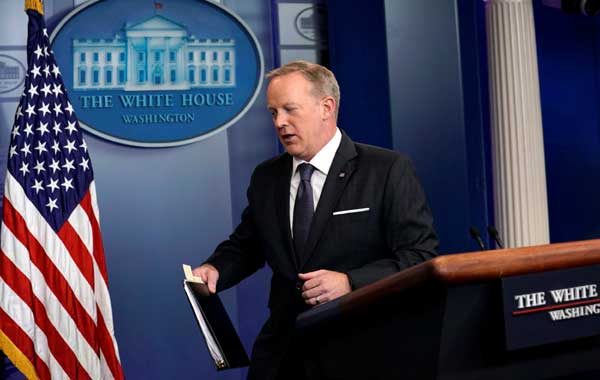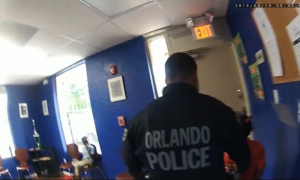|
White House spokesman Sean Spicer departs after holding a press briefing at the White House in Washington, US, May 30, 2017. [Photo/Agencies]
|
WASHINGTON - White House press secretary Sean Spicer is seeking to take on a more strategic role that would give him a limited presence in the daily press briefings that have made him a prominent face of the Trump administration.
A senior administration official and three people familiar with the potential changes said Monday that Spicer has discussed taking a more senior communications role at the White House. The three people said he has reached out to possible successors at the podium and as communications director. The people spoke on condition of anonymity in order to discuss internal deliberations before a final decision is made.
"We have sought input from many people as we look to expand our communications operation. As he did in the beginning, Sean Spicer is managing both the communications and press office," said Sarah Huckabee Sanders, a deputy White House press secretary. She declined further comment on the potential changes.
The people warned that no decision has been made and, as with all things involving President Donald Trump, the situation could change. Major staffing shake-ups have been a constant subject of conversation at the White House, but have failed to materialize in recent weeks, aside from the departure of communications director Mike Dubke in early June.
Those who have interviewed for senior communications jobs include David Martosko, the US political editor of London's Daily Mail, who covered the president's campaign. That's according to a person familiar with the interviews who spoke on condition of anonymity to discuss the private deliberations.
The possible changes for Spicer were first reported by Bloomberg News and Politico.
Spicer's public role has already diminished in recent weeks.
The White House has increasingly tapped Cabinet officials and other White House advisers to address reporters on camera and moved to take some of the daily briefings off cable television to keep the focus on Trump, who makes a habit of watching the televised performances.
Spicer spoke Monday from the podium at an off-camera gaggle that barred broadcast outlets from using the audio of the question-and-answer session. Asked about the changes, Spicer said Trump had spoken before cameras during an Oval Office meeting with the president of Panama and would later make remarks in front of the media at an event with technology leaders.
"There are days that I'll decide that the president's voice should be the one that speaks and iterate his priorities," Spicer said.
The White House has generally only used that excuse on days that the president has held a press conference or delivered a major speech.
Spicer's briefings have been must-see TV during the start of the Trump era, beginning with his fiery, inaccurate claim that journalists wrongly portrayed the size of Trump's inauguration audience. He has been the subject of recurring skits by comic Melissa McCarthy on "Saturday Night Live" and his afternoon briefings have garnered strong ratings.
In April the former Republican National Committee strategist apologized for making an "inappropriate and insensitive" statement comparing Adolf Hitler to Syrian President Bashar Assad by suggesting Hitler "didn't even sink to using chemical weapons." His comments ignored Hitler's use of gas chambers to kill Jews.
Trump threatened in May to shut down daily press briefings and told Fox News Channel at the time that Spicer was "doing a good job, but he gets beat up."The president has long seen himself as his most effective spokesman, and has faulted his communications team for much of the early turbulence at the White House as well as the backlash from the firing of FBI Director James Comey.








